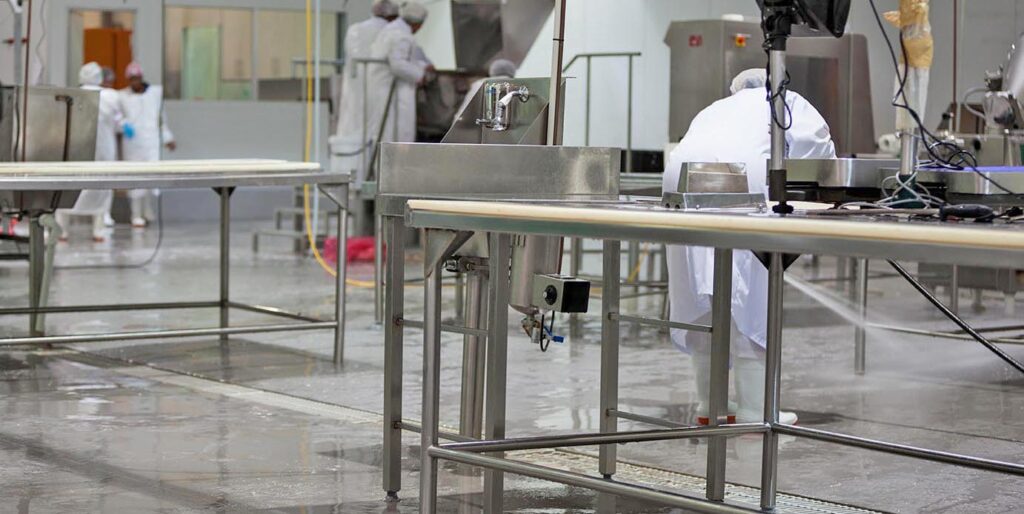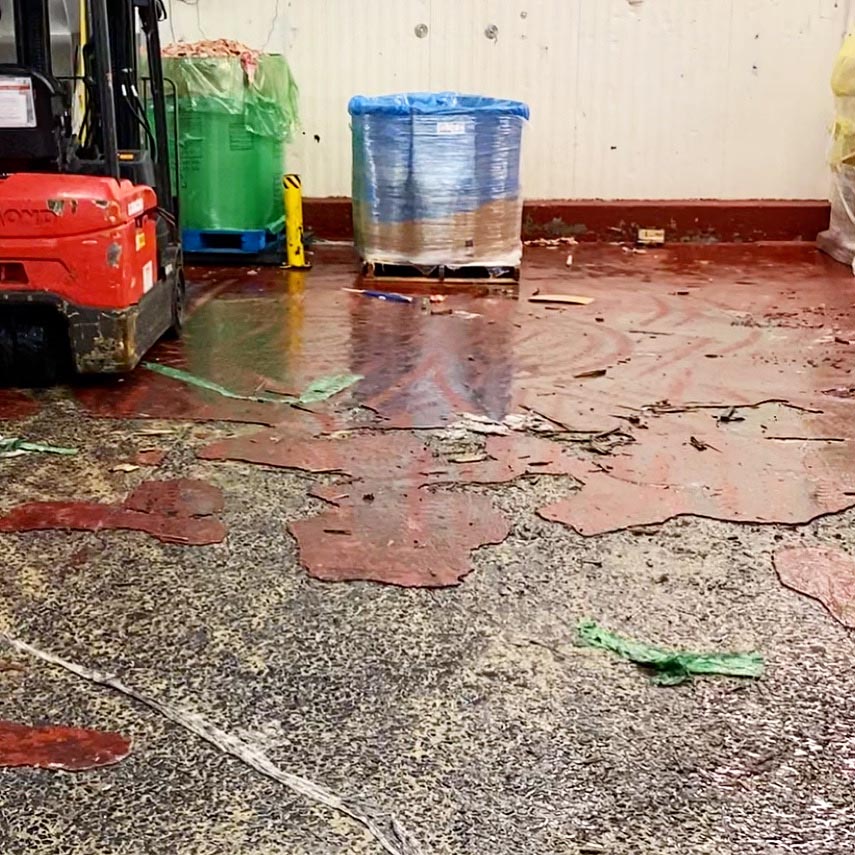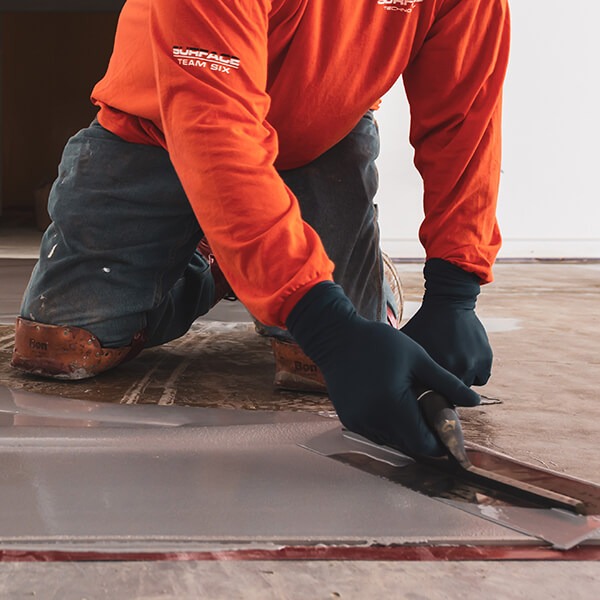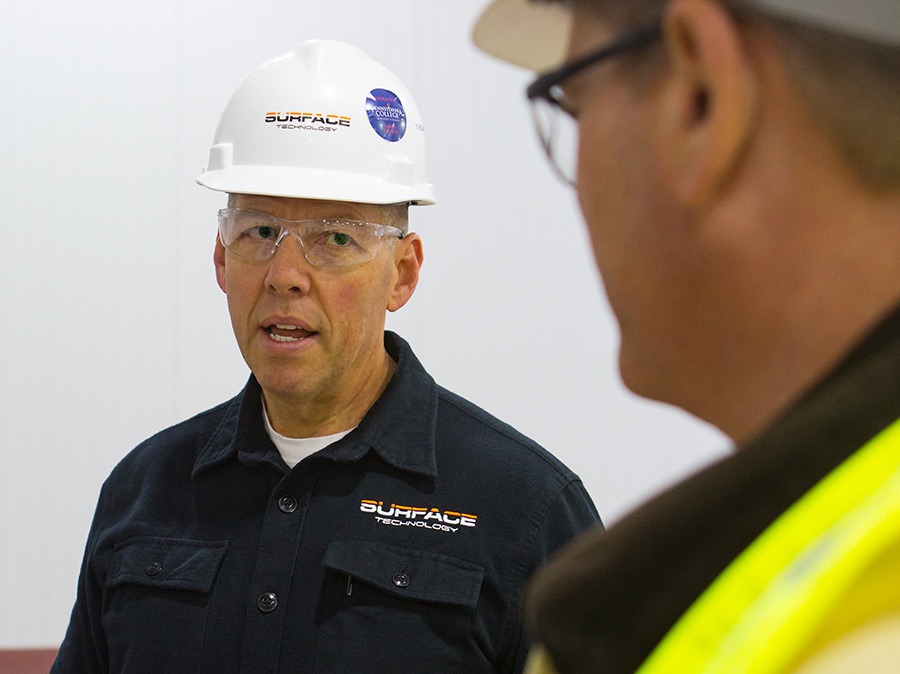Ensuring a Clean Food & Beverage Processing Facility
By Michael Greenblatt
President, Surface Technology, Inc.
The food and beverage manufacturing and distribution industries in the U.S. are known for high quality and safety standards. Even though COVID-19 rarely is transported on surfaces or food products, the global pandemic has focused increased scrutiny on all segments of our food chain. Food processing facilities of all sizes are critical components of our national infrastructure. They must review all aspects of their operations to ensure employee safety and product integrity.

USDA-regulated food manufacturers are required to follow Current Good Manufacturing Practices (cGMPs), and many have food safety plans that include a hazards analysis and risk-based preventive controls. cGMPs and food safety plans have requirements for maintaining clean and sanitized facilities and food contact surfaces. The FDA recommends that food facilities consider a more frequent cleaning schedule.
Following is a series of recommendations that food and beverage operations should consider when reviewing their existing operations, upgrading aging plants, or designing new facilities.
Current Status of Your Food Industry Flooring

Worn or cracked flooring can harbor bacteria. Your facility management team should perform a thorough inspection of your food or beverage processing operation to ensure it meets FDA and USDA standards. Many facilities are implementing a more frequent cleaning regimen using more potent concentrations of sanitizing solutions. Are the floors properly sloped throughout your plant to allow for easy wash-downs? Even non-manufacturing areas in a food plant should be inspected, such as break rooms, washrooms, etc. The current COVID-19 guidelines call for more frequent hand washing for all employees, so those rooms should also have upgraded flooring that is easily cleaned and antimicrobial.
If there is any degradation in the existing flooring – whether through foot traffic, temperature extremes, periodic cleaning, machinery vibrations, etc. – then now is the time to schedule a review by an industrial food factory flooring professional. Surface Technology, Inc. provides a free site visit to determine the parameters for your project, including square footage, substrate condition, and any external environmental constraints.
Surface Preparation
In 2020, many food and beverage manufacturing facilities increased the frequency of their cleaning schedule. To eliminate the possibility of standing water from these regular wash-downs, your team should carefully inspect the sloping and drainage in all areas and ensure an integrated cove-to-wall design to facilitate cleaning.
Proper preparation is essential to a successful food processing floor installation. That’s why we take the time to clean and prepare the surface first. This includes patching any holes or cracks and making any needed repairs. We also test for the presence of moisture or other contaminants and correct any issues before the new flooring is applied.
Types of Floor Coating Systems for Food Processing Plants
The materials used for food and beverage and other industrial facility flooring vary depending on specific needs but can broadly be divided into the following categories:
Epoxy – Epoxy is a resin comprised of 1-part epoxide resin and 1-part polyamine hardener. In the application process, the epoxy is left to cure for a minimum of 24 hours. When cured, it produces polymer structures that give the substance great strength and durability. This type of floor coating is non-porous and is used in high impact facilities where optimum durability is the top priority. Highly resistant to chemical spills and abrasion, these systems are often used with decorative chips or colored sands. We can achieve an infinite array of color schemes or patterns with this material.
Urethane Cement – Urethane cement is a combination of a polymer binder (urethane) and fillers (cement and aggregate). Urethane Cement is also referred to as polymer concrete. Urethane cement can be used in floor coating systems. They can be self-leveling, roller applied, or trowel applied. Urethane cement coating systems can tolerate high moisture, which makes them suitable to be installed directly onto concrete. Urethane cement coatings are well known for their chemical and temperature resistance. They also provide wear-resistant, durable, and seamless floor finishes that are easy to clean. Urethane cement flooring systems are tailored to the demanding service conditions found in the food and beverage industries, industrial, pharmaceutical, and healthcare environments.
Acrylic (MMA) – MMA is a dual system polymer that is not as hard or durable as epoxy but is a formidable option for commercial flooring. MMA has a low glare satin finish and is resistant to weak acids, alkalis, solvents, and scratches. It is also highly flammable and odorous, so special ventilation and installation procedures must be implemented.
Polyurea – Polyurea is an organic polymer that is the result of a reaction from mixing an isocyanate and resin blend component. Polyurea has a rubber-like feel, making it not as hard as epoxy but still extremely durable. Polyurea flooring has a high-gloss finish, is highly stain and chemical resistant, and has a high heat tolerance.
Polyaspartic – Polyaspartic coatings are a relatively new technology for concrete floor coatings. Initially developed in the 1990s to protect steel from corrosion, they are now being used to protect industrial facilities’ concrete floors. Originally developed with low VOC in mind, all polyaspartic coating systems are low or zero VOC. Polyaspartic coatings possess nearly identical properties as the best two-component aliphatic polyurethane coatings. They are long-wearing and abrasion, scratch, chemical, UV, and impact resistant. In contrast to epoxies and polyurethanes, polyaspartic coatings provide faster drying time, and the high film builds allow for a much quicker return to service. They also resist stains and slightly higher temperatures than other types of coatings.
Antimicrobial Flooring
With the increased attention on sanitation in all facilities due to the COVID-19 virus, most food and beverage operations are now installing seamless, antimicrobial epoxy flooring.
Your floor is the largest single surface in your facility. It has the most significant exposure to microbial contamination of any part of your operation – tracked in by staff and visitors, on the wheels of carts and tow motors, by rodents or insects crawling through small cracks in your doors, or blown in by the wind through open loading dock bays. Designers and facility planners need to understand what it will take to sanitize, disinfect, and decontaminate various surfaces. A healthy building must address air-, water-, and fluid-borne sources of contamination, as well as those which can spread through physical contact.
Antimicrobial epoxy flooring from Surface Technology, Inc. provides the highest-possible contamination-fighting properties not only across the surface of your floor but throughout the polymer material used to make it, giving you the additional anti-pathogen safeguards you need inside and out. Flooring systems can be installed with an integral cove base which can be seamlessly transitioned to the wall system.
Here is a list of some of the microorganisms controlled by our antimicrobial components in our flooring systems:
Fungi:
- Aureobasidium pullulans (Black Yeast)
- Aspergillus flavus (causes mold on stored grains)
- Aspergillus niger (Black Mold)
- Aspergillus terreus (a fungal pathogen)
- Penicillium pinophilum (a food contaminate)
- Rhizopus nigricans (Bread Mold)
Yeasts:
- Candida pelliculosa (causes yeast infections)
Bacteria:
- Aerobacter aerogenes (produces gas that sours milk)
- Bacillus subtilis (Hay Bacillus)
- Desulfovibrio desulfuricans (a cause of gastrointestinal disorder)
- Escherichia coli (E. coli)
- Klebsiella pneumoniae (produces lung pathology)
- Pseudomonas aeruginosa (an opportunistic human pathogen)
- Salmonella typhosa (Salmonella)
- Staphlococcus aureus (Staph)
Actinomycetes:
- Streptoverticillium reticulum (Pink Stain)
Installation

When it comes to food processing, maintaining a hygienic facility is paramount. You need durable, high-performance food-grade flooring that can stand up to the rigors of frequent cleaning, harsh chemicals, extreme temperatures, high foot traffic, and much more. You also want flooring that discourages bacterial growth and provides a safe, non-slip surface to keep employees safe.
Installation is the most critical aspect of your epoxy or polyurethane flooring solution. If something goes wrong during the install—if the floor isn’t properly prepped, if mixes aren’t correct, or if the coatings are not properly allowed to cure between coats—your floor and its longevity will be compromised.
Michael Greenblatt founded Surface Technology specifically to take control of this process and provide a consistently superior installation for every job. Initially formed as an installation contractor for an industry-leading firm, Surface Technology’s stellar reputation for fast, quality installations quickly increased demand for its services. Greenblatt saw an opportunity to improve his company’s ability to provide custom industrial flooring solutions by increasing the range of premium branded flooring materials his firm installs. When Surface Technology made the move to offer a wider range of products, the firm’s ability to match the performance needs of its customers increased exponentially.
Today, Surface Technology is one of the leading independent industrial floor contractors in the United States. Their flooring professionals average more than 20 years of field experience—one of the highest in the industry. They have a LEAN/SIX SIGMA continuous improvement process, using state-of-the-art preparation/installation equipment and techniques.
Experience and Reputation
When it comes to flooring, it’s important to ensure that the people you are working with are highly experienced and respected in the flooring industry.
The contractor and their team must be able to work 24 hours a day, 7 days a week, 365 days a year. They must be ready to work around the clock during planned shutdowns and respond within 24 hours to requests for flooring projects that get the green light during unforeseen emergencies that result in unplanned shutdowns. They must have the labor and materials available at a moment’s notice, so you never have to wait for them.
You must choose a food and beverage flooring contractor who is a proven leader in the planning and installing high-performance industrial flooring, coating, and lining systems in the food and beverage industry.

Surface Technology is a licensed industrial flooring contractor, able to complete projects in food processing plants anywhere in the United States. We work with facility owners, design-build firms, construction management firms, and general contractors to provide industrial flooring solutions for projects ranging from 1,000 to more than 1 million square feet.
We are fully qualified to handle industrial floor coatings in Divisions 7 and 9 of the CSI MasterFormat® list. Surface Technology is bonded up to $2 million.
Surface Technology has been recognized by national publications, trade associations, and construction professionals as a performance and quality leader among flooring contractors. Our expertise in delivering high-performance floor systems for industrial projects across the country is unsurpassed.
Get in Touch
We know you’re busy. We’re here to get you the information you need as quickly as possible. Whether you just want a quick estimation on your project specifications or want to talk to an expert about your project, we are here to help you.

